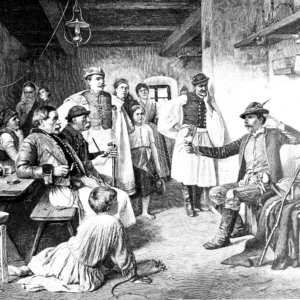How Previous Generations Influence Our Decisions

Topics
Column
Researchers have come to know a great deal about how people choose to behave toward future generations, and why. Over the past 18 years, studies have identified the psychological barriers that define intergenerational dilemmas, such as when a current generation must give up benefits to act on the behalf of future generations. We have discovered that stewardship and legacy concerns, for example, can guide how citizens express generosity to future generations.
What we don’t know enough about is how previous generations influence our current decisions.
Here’s why it matters: Many stories from our ancestors were designed to keep new listeners from repeating the mistakes of the past. But in an era where the closest we get to modern folktales are TED talks, are organizations at risk of losing touch with the lessons of the past? In a time of great technological change, which demands reflection and a clear corporate culture as well as creative propulsion, this is a vital question.
The Emotional Power of Storytelling
To examine this issue and better understand how companies might use their own histories to strengthen their cultures, my doctoral student Cat Owsik and I have been exploring what we call inherited affect — the emotional state passed on from thinking about the actions of previous generations.
Get Updates on Transformative Leadership
Evidence-based resources that can help you lead your team more effectively, delivered to your inbox monthly.
Please enter a valid email address
Thank you for signing up
Before Owsik came to work with me on the Convergent Behavioral Science Initiative at the University of Virginia, she worked with indigenous groups in Canada. This has proved to be an especially apt background for studying inherited affect given the powerful effect that oral traditions have on how current First Nations members choose to behave. In these groups, stories of the past tend to foster a deep connection to the land and the fundamental human life cycle. This makes sense given the relevance of natural factors to indigenous groups’ survival.
Importantly, inherited affect not only conveys the value of specific lessons but also connects generations across time toward a common end, such as survival. It transmits a sense of reciprocity and intergenerational partnership that maximizes collective welfare.
Such a process is so essential to promoting human survival that every culture has folktales that have traditionally been passed down from previous generations — Icarus flying too close to the sun and melting his wings; the little Dutch boy who plugged the dike and saved Holland through his lonely efforts; the naked emperor about whom only a child dares to say, “He has no clothes.” These stories transmit cautionary lessons to future generations: Follow the advice of your elders and don’t be reckless. Take responsibility, even if you think you’re too small to matter. Remember that not everything you’re told is real. Stories of the past, both true and mythical, affect our current behavior and thinking, which in turn shapes our collective future.
Origin Stories Shape Culture
Some companies borrow the folktale practice by employing their founders’ origin stories as a tool to strengthen their organizational cultures. Virgin’s founder Richard Branson retells the story of his mother kicking him out of a car when he was six and misbehaving, a moment that he credits with teaching him independence and risk-taking. Tesla’s cofounder and CEO Elon Musk recalls poring through science fiction novels for more than 10 hours a day as an 8-year-old, as well as building rockets and making explosives (with little adult supervision). As in the superhero world, an origin story is part of what guides a person’s decision-making through time and toward a meaningful end.
In business, this translates to using long-standing objectives and investments that align with core values. But it’s becoming more difficult for stories and clear objectives to be passed on within organizations. Employees move between companies at a faster pace than decades ago, leaving little time to transmit organizational mythology. Oral traditions risk being drowned out by informal digital communication such as texts or chats.
Maintaining sight of the past is crucial, particularly for companies that have undergone substantial corporate restructuring due to mergers or acquisitions, or endured dramatic market changes brought about by deregulation, economic shocks, or the risk of becoming technologically obsolete. Without ties to the past, an organization has no guiding purpose. Managers lack reliable decision-making heuristics for understanding the potential risks and benefits of their actions.
Businesses that lack substantive connections to their past, or that attempt to erase them, might be doomed to repeat the mistakes of previous generations. Worse, they might hurt our collective well-being.
Tales Can Prompt Moral Outrage or Deep Affection
In exploring this topic, I began thinking deeply about the effect of previous generations when considering how people react to mistreatment. Take the example of hazing. Prominent scandals during the past couple of decades have led to the general condemnation of initiation rituals that inspire humiliation and physical strain. In particular, moral outrage arising from these practices has changed the course of how institutions evaluate and monitor the treatment of newcomers, such as college freshmen and military cadets.
In effect, past generations, through accounts of their actions, prompted current generations to feel morally outraged. This emotion, in turn, has influenced how people choose to act toward future generations.
We also know from existing research that the intentions of past generations are important. When we know that previous generations intended to behave generously, we are more likely to pay it forward and act generously to future generations. Interestingly, this occurs regardless of the actual inherited outcome we experience.
Taken together, these insights are intriguing: They imply that learning about the behavior and intentions of previous generations can provoke enduring emotions and catalyze sustainable trajectories of action. The lesson to companies is that stories have value all on their own to shape behavior.
Amazon, for example, has tried to protect the distinctive nature of shoe company Zappos, which it acquired in 2009, by keeping it at arm’s length. Zappos has remained an independent entity and maintained its flair for quirkiness and love of its customers. Through stories, such as the tale of a customer representative staying on the phone with a customer for over 10 hours, employees transmit not only company values but also the way they feel about them. Zappos has capitalized on this tradition by developing ads based on true customer stories. Similar to other companies such as Nordstrom and Southwest, which have comparable affect-laden storytelling traditions, Zappos has used tales of the past to reinvigorate its ability to craft a bright future.
More companies would do well to become storytellers like Zappos, Nordstrom, and Southwest. If we look at stories as communication systems that can convey the most benevolent of intentions — to help others survive and thrive — it is easy to understand why inherited affect can change current behavior. The feelings we have about the actions of those who came before us can prompt us to act kindly toward future generations, and even to take on burdens on behalf of future generations. In the absence of such intergenerational narratives, we are left evaluating what has been left to us by previous generations without the emotional tools to approach the future with purpose and generosity.

